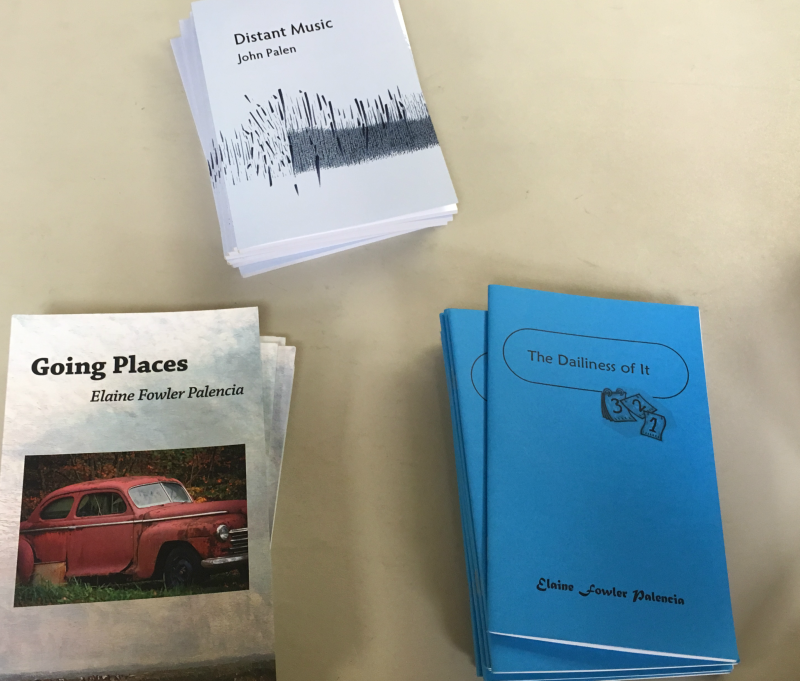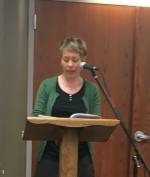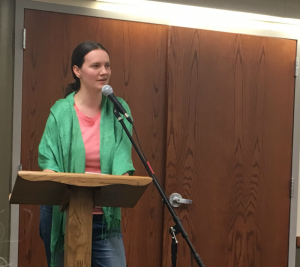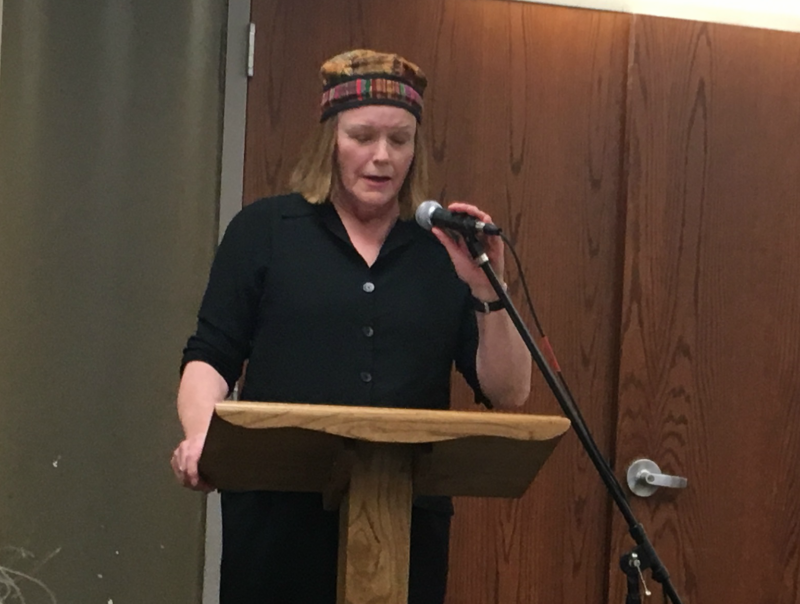The Quintessential Poets, a six member poetry group, closed out National Poetry Month with a poetry reading at the Urbana Free Library. The group and public gathered in the Lewis Auditorium on April 30th to enjoy a night of poetry.
When I arrived, the relatively empty room left a bit to be desired. Its beige aspect felt more suited to a financial meeting than a poetry reading. As the space filled with people—enough that more chairs had to be found—the ambiance improved. And, when the woman next to me spilled her cup of coffee during the first poem, the strong smell of coffee clinched the mood.

Poet John Palen opened the night and introduced the audience to The Quintessential Poets. They originally formed four years ago and meet every other week to critique each other’s work. Palen then presented the first poet to read, Elaine Palencia. Palencia read five original poems including a persona poem where she imagines the thoughts of a bonsai as it encounters other plants and trees. Another poem was written in response to the writing of Wendell Berry. In the poem, Palencia told the real stories and fates of farmers in her family.
Next to read was John Palen, a founding member of The Quintessential Poets. He shared that he had not chosen the poems he was to read, but allowed his daughter to choose his poem list. He shared poems from his newest book, Distant Music. The titular poem, “Distant Music” conjured imagery of classic music traveling from the cello across Missouri farmland and through time.
Third to read was Frank Modica, a poet who gravitates toward themes of food, family, and history. The poems he read exemplified those themes. He shared the story of writing his poem “Twelve Flags,” written after his mother asked him to write a poem about family that was nice. The poem opens with “Italy pissed on grandpa” and then tells the story of his grandfather’s journey to America and the life he lived that lead to his grandchildren and the legacy he created.
 Next to the microphone was Emily Kerlin, the newest member, which she translated for the audience to the “most nervous.” She opened with a tribute poem for her grandmother titled “What Took.” She provides a list of things she learned through her grandmother including reusing ziploc bags and putting something crunchy into every meal. The impact her grandmother had on her life comes through the sometimes mundane list, giving each item depth and soul.
Next to the microphone was Emily Kerlin, the newest member, which she translated for the audience to the “most nervous.” She opened with a tribute poem for her grandmother titled “What Took.” She provides a list of things she learned through her grandmother including reusing ziploc bags and putting something crunchy into every meal. The impact her grandmother had on her life comes through the sometimes mundane list, giving each item depth and soul.
Pat Simpson then took to the podium. Among the poems she read was a persona poem, speaking as Walt Whitman during his time as a volunteer nurse during the Civil War. Simpson shared that she had read this poem two years prior, but thought that it was relevant today. The poem began “my opinion is to stop the war now,” a quote taken from Walt Whitman. The poem continues with themes of the brutality of war as Walt Whitman walks through an army hospital ward. Simpson did not shy away from politics, explaining that social justice is another one of her passions.
 Last at the podium was Mary McCormack Deka, who travelled two hours to the event from where she resides in Chicago. The drive was well worth her short set, during which she read a collection of short poems. Many of her poems focus on viewing everyday objects or scenes through a new, fantastical lens. She shared that she has a unique way of viewing the world and tries to share that view through her poetry. The first poem she read was actually written while she was choosing the poems to read for the event. Titled “Naming Things,” the poem evoked all of the senses of spring—the sounds, feel, smell, even taste, but left out the sights. She recalled the poem with her eyes closed and once finished, shared that after writing the poem she realized the narrator of her poem is blind. The narrator asks in the poem if the sight could possibly be better than what she can imagine. McCormack Deka also gave life to a china cabinet and new books in her poetry, offering the audience with new ways to view these objects.
Last at the podium was Mary McCormack Deka, who travelled two hours to the event from where she resides in Chicago. The drive was well worth her short set, during which she read a collection of short poems. Many of her poems focus on viewing everyday objects or scenes through a new, fantastical lens. She shared that she has a unique way of viewing the world and tries to share that view through her poetry. The first poem she read was actually written while she was choosing the poems to read for the event. Titled “Naming Things,” the poem evoked all of the senses of spring—the sounds, feel, smell, even taste, but left out the sights. She recalled the poem with her eyes closed and once finished, shared that after writing the poem she realized the narrator of her poem is blind. The narrator asks in the poem if the sight could possibly be better than what she can imagine. McCormack Deka also gave life to a china cabinet and new books in her poetry, offering the audience with new ways to view these objects.
The night gave credence to both big ideas such as war, family, and suicide, as well as giving space to things that can be overlooked—furniture, button hooks and plastic shopping bags. Some of the poems may have been better enjoyed with multiple readings, pen in hand, discovering new meaning with each study. But, each poet’s unique voice carried their reading, providing the audience with fresh perspectives. With numerous allusions and references to writers and poets in their work, this group payed homage to poets that have come before them, making this the perfect event to close out National Poetry Month.
___________________________________________________________________
Photos by Micheala Grady.








